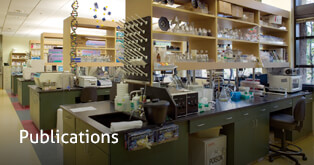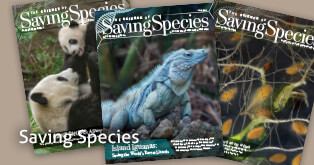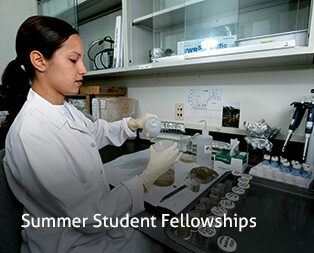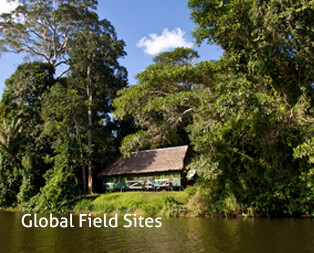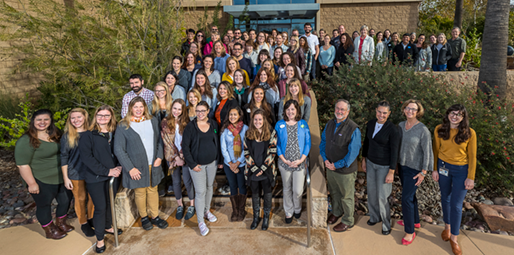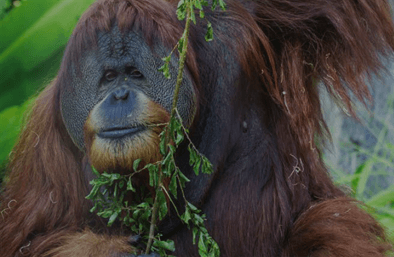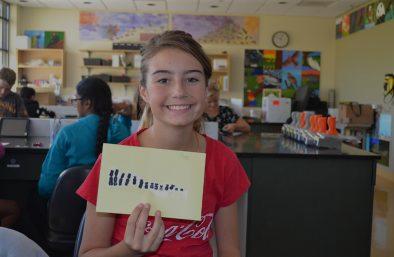The Conservation Science Summer Fellowship is a 12-week program where undergrads work directly with a mentor from the Conservation Science team of their choice. Within those 12 weeks, the fellows gain hands-on experience while completing a project. Fellowships are based at the Beckman Center (Escondido, CA) unless otherwise stated.
Applications for the 2026 Conservation Science Summer Fellowships can be submitted until February 15, 2026. Applicants should specify which team’s fellowship they are applying for; applicants can only apply for one team, not multiple teams. If you apply to multiple teams, the team you applied to first will be the only one considered.
Applications can be submitted through our job page.
https://sandiegozoowildlifealliance.org/jobs
Current undergraduate students must be officially associated with a college or university to be eligible for the fellowship program. Undergraduates who are currently enrolled in college meet this criterion, as do graduating seniors who are continuing their education.
Summer 2026 Conservation Science Summer Fellowships
- Monday, May 18th to August 7th
- Monday, June 22nd to Friday, September 11th
Fellowships are 40 hours per week for 12 weeks. Fellows will receive an $8,520 stipend. To apply, please visit San Diego Zoo Wildlife Alliance’s careers page.
Conservation Science Teams
Reproductive Sciences innovates and applies science and technology to solve reproductive challenges and to support the conservation of endangered species. The major areas of investigation include gamete physiology, assisted reproductive technology, hormone monitoring, environmental toxicology, cryobiology and biobanking, avian physiology, cell culture, and stem cell biology.
Plant Conservation researches the restoration and management of rare plant populations, both ex situ and in situ. This team is seeking two research fellows, one to join the micropropagation and cryopreservation lab and one to join our Native Plant Gene Bank on seed banking, testing, and propagation. Independent projects are developed with mentors to meet program and conservation needs and aligned with the skill sets and interests of the selected applicants. For the micropropagation project, we would introduce the fellow to growing plants in controlled environments (i.e., in vitro) and adjusting that environment to produce certain tissue types. Their independent project would work on an aspect of micropropagation of a rare species to work towards developing material for cryopreservation, or helping recover material post cryo-freeze efficiently and effectively. The Native Plant Gene Bank fellow will learn various aspects of seed banking from population research and identification in the field to germination testing of collected seed in the lab. Their independent project would look at factors influencing the germination of rare plants and/or their propagation. In addition to independent projects, selected fellows will round out their fellowship with work on all facets of Plant Conservation programs.
Community Engagement is driving conservation action through science education and community collaborations. Our applied conservation social science group conducts research on human-wildlife interactions so that conservation strategies address both the threats species face as well as the needs of local communities. The work of the team involves understanding human behavior and viewpoints to inform species conservation planning.
Conservation Genetics uses innovative genetic and cellular approaches to assess, monitor, and manage endangered species, contribute to their sustainability, and prevent species extinction. They conduct collaborative research using cellular biology and genome-wide sequencing to develop tools for species of conservation concern. They use cells as models to advance conservation efforts, propagate and reprogram tissue culture cells to produce induced pluripotent stem cells, and direct their development for genetic rescue efforts for critically endangered species. The team is seeking two fellows, one for each of the following projects.
- Safeguarding Hawaiʻi’s Forest Birds from Extinction by optimizing biobanking protocols for ESA-listed Hawaiian Bird Species.
Project description: This project aims to enhance species-specific cell culture by evaluating tissue types (skin, lung, muscle) and media formulations to improve fibroblast establishment and growth rates. Because protocols are highly species-specific, optimizing these methods is critical for successfully biobanking endangered species. Furthermore, we will validate cell viability by analyzing proliferation, morphology, metabolism, and senescence markers in established primary cells. These comprehensive assessments will ensure the banked material is viable for future biotechnological applications. - The summer fellow will assist the stem cell team in reprogramming Pacific pocket mouse fibroblasts to induced pluripotent stem cells. We will focus on optimizing the reprogramming process, culture conditions, and testing differentiation potential of the generated cell lines. We will also test methods for confirming pluripotency including antibody screening and quantitative PCR primer design and testing. The fellow will gain experience in sterile techniques, the differences and similarities in culturing endangered species cells, and testing/modifying differentiation protocols.
Recovery Ecology leads large-scale conservation programs that advance the recovery of endangered and threatened species locally and globally. The team applies behavioral and ecological science to address pressing conservation challenges. Their toolbox includes the development and testing of conservation breeding methods, reintroduction and translocation strategies, and long-term monitoring and adaptive management in species recovery programs. By integrating behavioral, population, and spatial ecology with other disciplines, Recovery Ecology develops evidence-based solutions that improve conservation outcomes.
Fellowships will be based at the Beckman Center for Conservation Research, with potential opportunities to participate in fieldwork and conservation research at associated sites. The program seeks two fellows, each supporting one of the following projects.
- One fellow will have the opportunity to work with the kangaroo rat recovery program to assist with research on the impacts of artificial night lighting on foraging behavior and habitat use. This project combines fieldwork and computer-based analyses to evaluate how lighting intensity, spectrum, and/or spatial distribution influence kangaroo rat activity patterns and habitat selection. Fieldwork will be conducted at study sites in Riverside and/or San Bernardino Counties. Findings will inform strategies to mitigate the effects of light pollution and support habitat management recommendations for at-risk kangaroo rat populations. In the long term, this research will contribute to understanding how anthropogenic disturbance shapes species persistence and behavior in arid and semi-arid ecosystems.
- One fellow will have the opportunity to work with the burrowing owl recovery program to assist with piloting the use of a novel camera trap system for assessing prey species populations. This project will include looking at prey species in grazed and ungrazed plots. In the long term, we aim to understand the drivers of burrowing owl population trends, including prey availability. The project will be conducted across sites in San Diego County and will help us develop best practices for the use of this camera trap method. These data will be critical for developing protocols for monitoring in grassland ecosystems, and inform monitoring plans for burrowing owl and other grassland species of conservation concern.
Disease Investigations’ mission is to remove disease as a roadblock to wildlife conservation. They identify and solve health problems by carrying out comprehensive disease surveillance programs, disease outbreak investigations, and targeted disease research for the animals in our facilities and field conservation programs. Fellowship research projects generally focus on molecular biology, toxicology, and/or pathology. This fellowship is based either at the Beckman Center (Escondido, CA) or the San Diego Zoo (San Diego, CA). This summer we plan to work with our summer fellow to develop disease testing platforms, which may include Oxford Nanopore Technology, Biomeme technology, and/or gold standard testing with PCR and qPCR in house. The goal will be disease testing that can be used both in-house and in the field. This work will mainly be at the Beckman Center with the option to visit San Diego Zoo for pathology experiences.
Population Sustainability uses an interdisciplinary approach, with a focus on innovative technologies and ecology, to assess and address challenges to the persistence of threatened species. The team is seeking two fellows with backgrounds in computer science, software engineering, electrical engineering, or a related field (or with related experience) to work in our Conservation Technology Lab, one for each of the following two projects:
- One fellow with interest and capabilities in computer vision and/or machine learning. The fellow will work on software systems for processing image and/or video data from field camera systems deployed in a variety of ecosystems globally to automatically produce derived data about the species and individuals present in the imagery and/or their behavior.
- One fellow with an interest and capabilities in programming embedded systems, particularly in contexts where power is limited. Interest in machine learning inference on constrained devices (e.g. TinyML) and/or low-power radio communication (e.g. LoRa) is a plus. The fellow will work on projects where image and/or sound data is processed directly on field equipment so that small reports can be transmitted over low-bandwidth connections and/or the equipment can respond autonomously.
Conservation Planning and Strategy team
We are a small team of professional conservation planning and strategy experts working to maximize the impact of SDZWA's conservation work. We work across all teams within the Conservation Science and Wildlife Health (CSWH) department to plan and continually evaluate the institution's ~35 global conservation projects, which are divided into eight geographic hubs. CSWH uses the Open Standards for the Practice of Conservation (Conservation Standards) for conservation planning, and the Conservation Planning and Strategy team helps the CSWH department apply the Conservation Standards to their projects to ensure this work has measurable impact for wildlife, landscapes, and people around the world. We also disseminate information about our conservation projects, overall conservation strategy, and the Conservation Standards across all of SDZWA.
The conservation fellow would assist the Conservation Planning and Strategy team in their efforts. They will have the opportunity to work with the full range of SDZWA's conservation projects, from polar bears in the Arctic to butterflies in the southwestern United States. The exact way a fellow contributes will vary depending on their strengths and interests but would likely involve assessing data from across SDZWA's conservation projects to identify trends, areas of strength, and areas that could be improved. Furthermore, a fellow may assist in reviewing the experiences of other conservation organizations to help identify what works well and what should be avoided. Finally, a fellow may assist in the communication of formal conservation planning materials. Overall, the fellow will gain valuable experience related to planning and implementing impactful conservation projects.
Summer Fellowship FAQ
When is the deadline for receipt of applications?
The deadline to apply for 2026 summer fellowships is February 15, 2026. All applications must be received via email by February 15 at 9:30 p.m. Pacific standard time (PST).
What is the start date for the 2025 fellowship?
The start date is determined based on the student's school schedule (semester or quarter), and is either Monday, May 18th (through Friday, August 7th) or Monday, June 22nd (through Friday, September 11th).
Are letters of reference required or advised?
One letter of reference is recommended but is not required. Letters may be addressed to the Selection Committee and should be emailed directly by the author of the letter to hodavis@sdzwa.org.
If sending the letter/s by mail, the address is:
Conservation Science, San Diego Zoo Wildlife Alliance:
Attn: Holly Davis
15600 San Pasqual Valley Rd.
Escondido, CA 92027
Are specific core biology courses required?
There are no required courses for summer fellows.
Is the program open to any college student?
The program is only open to undergraduate students who are actively enrolled in a degree-granting institution or who will receive their degree in the year they apply and are continuing to a graduate program. (e.g., master’s degree, veterinary medicine, doctorate).
Can international students apply for the fellowship program? When an application is submitted, international candidates must be able to show proof they are legally allowed to live and work in the United States during the tenure of the fellowship to be considered. This documentation can be a J1 visa or an F1 with a CPT or OPT visa.
Is the summer fellowship paid?
The summer fellows are full-time, 40-hour-per-week, 12-week positions. Fellows are not classified as San Diego Zoo Wildlife Alliance employees and are paid via a stipend. The current stipend amount is $8,280 for the 12-week program.
What hours are summer fellows expected to work?
Fellows are expected to work a minimum of 40 hours per week. Depending on the specific nature of the fellow's project, after-hours scheduling may be involved, including weekends and/or evenings. These hours must be completed onsite—remote work is not permitted.
Are fellows given holidays/days off?
The May cohort may take off Memorial Day (May 25) and Independence Day (July 4). The June cohort may take off Independence Day (July 4) and Labor Day (September 7).
What are the typical duties of summer fellows?
Specific research projects are only chosen once the fellow meets with the research group's director and other employees within the group. Directors will communicate duties once the specific research project is agreed upon, but they typically involve applying standard laboratory or field techniques to conservation questions.
Can course credit be obtained through the fellowship program?
No credit can be obtained through this fellowship program unless your home campus considers it worthy of credit. This would need to be arranged by fellows independently.
Is public transportation to the Beckman Center available?
It is required that all summer fellows have their own transportation. Bicycles are not a safe mode of transportation due to the high speed of vehicles and the incline of roads to the Beckman Center. Access via public transport is extremely limited and time-consuming, and there is no public transportation on the weekends. Fellows without access to a car will need to arrange shared transportation with other fellows in advance and should be prepared to provide appropriate compensation for any transportation provided. Parking for private vehicles is available at the Beckman Center.
Is housing provided?
Housing is not provided but is generally available through online sources such as Craigslist, Sonder, Airbnb, and Vrbo.
Are fellows given each other’s contact information in advance?
Contact information (phone number and email address) for all the summer fellows will be shared as soon as they have been offered and accepted their fellowships.
How can I make my application more likely to succeed?
Obtain more research experience (field and/or lab), provide strong letters of recommendation, keep grades high, and write a thoughtful and meaningful statement of interest that is relevant to the types of projects that occur at San Diego Zoo Wildlife Alliance. Helpful details to include are interests that separate you from the large group of applicants that "like animals" and want to contribute to conservation; scientific expertise; details of practical experience; independent work skills; and a solid commitment to learning about research design, data collection and analysis, and disseminating results in the form of presentations and publications.
Where can I gain the experience to compete in the fellowship program?
Volunteer in a research lab on campus or in the industry and/or volunteer on a field project. Many colleges and universities have opportunities for students to volunteer in the field or the lab with graduate students or professors. Gain as much hands-on research experience as possible!
When will fellows be informed they have been accepted into the program?
An official offer is emailed shortly after verbal contact and acceptance.
Is there an orientation to the program for incoming fellows?
Fellow orientation will start at 8:30 a.m. on the first day and will be hosted by the Conservation Science coordinator. After orientation, fellows will start work with their mentors. Social gatherings and other events are arranged throughout the fellowship.
What are the details of the student poster session presentations?
At the end of the summer, fellows participate in a poster presentation session to present their work. Dates are based on when the students start/end their fellowships. Typically, poster sessions fall during the 12th week of the fellowships. Exact dates and more information to follow.

